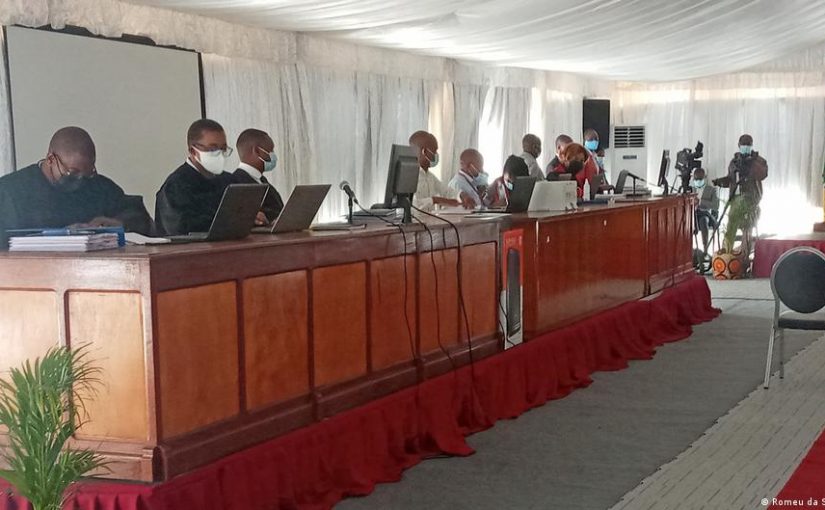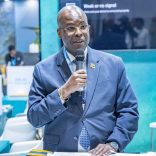Mozambique to renew tourism sector agreements with neighbouring countries
“Hidden debts” trial: 30 August 2021- Lusa reports

Photo: DW
- Ex-president Guebuza’s son claims political motivations
The lawyer of Armando Ndambi Guebuza, a defendant in the so-called ‘hidden debts’ case, said on Monday that the detention of the son of former President Armando Guebuza is illegal, considering that there are political motivations in the case.
“It [an arrest] is illegal,” Isálcio Mahanjane said in statements to the media on the sidelines of the trial of the hidden debts’ case taking place in tents erected in the space of the maximum-security jail in Maputo, due to the logistics involved.
“I would venture to say that the motivations are political,” Isálcio Mahanjane, who has argued for the illegality of the detention on the grounds of an alleged violation of preventive detention periods, stressed.
Armando Ndambi Guebuza is among the 19 defendants on trial in the case of the hidden debts, which began a week ago.
The former Mozambican president was in court on Monday.
According to the Public Prosecutor’s Office, the various crimes the defendants are alleged to have committed include association to commit a crime, influence peddling, passive corruption, money laundering, embezzlement, abuse of office or function and document forgery.
In the scheme, according to the indictment, Armando Guebuza’s son allegedly received $33 million (almost €28 million) in bribes to influence his father for the approval of the coastal protection project used as a pretext to contract the hidden debts of $2.2 billion (€2 billion).
But according to Ndambi Guebuza’s lawyer, the accusations by the Public Ministry are unfounded and lack evidence.
- Son of ex-president Guebuza denies bribes
Armando Ndambi Guebuza, eldest son of former Mozambican President Armando Guebuza, on Monday denied in a court having received money from Privinvest, a shipyard company accused of paying bribes as part of the hidden debts’ case.
The public prosecutor has charged Armando Guebuza with having received $33 million (€27.9 million) in bribes so that a project presented by Privinvest for maritime protection of the Mozambican Exclusive Economic Zone would obtain approval, serving as a pretext for the hidden debts scheme.
“I never received any money from Privinvest,” said Armando Ndambi Guebuza, 44, a real estate manager, responding to a direct question from the judge in the hidden debts’ case.
In the trial on Monday, he said he did not know the origin of an email in which the alleged consultant in the project with Privinvest Teófilo Nhangumele fixed with Jean Boustani, negotiator of that company, the value of $50 million (€42.3 million) of bribes to be divided by the defendants.
“I never had that kind of conversation with them. I do not know that email,” he stated.
When questioned about a document in which he confirmed to Privinvest that he had received an amount of $14 million (€11.8 million), Ndambi Guebuza categorically refuted the authorship of that document.
The accused accepted to have signed a contract with Privinvest in which he is described as a mechanic, even if he is not, to obtain a residence visa in Abu Dhabi.
In court, he accused Privinvest of authoring the document and placing mechanic’s profession in the contract.
Armando Ndambi Guebuza accused the Public Prosecutor’s Office of lack of seriousness, blaming the institution for having released parts of the procedural acts still in the phase of justice secrecy.
On bank transfers ordered by him (in rand, South African currency), Armando Ndambi Guebuza said that these are financial transactions that fall within his business universe, telling the judge that he did not intend to go into detail about such transactions.
“I have partnerships with Jean Boustani,” he said, laconically.
The son of the former Mozambican president testified in court on Monday with his father in attendance in a case in which the former head of state is also a declarant and is due to appear in court to be heard for his role in the hidden debts scheme.
The defendant spoke with a personal doctor on standby because he had health problems.
In allegations read out a week ago, at the start of the trial, the prosecution accused the 19 defendants in the case of the hidden debts of having associated in a “gang” to fleece the Mozambican state and leave the country in a difficult economic situation.
“Whoever forms a gang to steal from the state does not serve the state. The defendants acted together, putting their private interests above the interests of the state,” said Ana Sheila Marrengula, the public prosecutor who read out the indictment.
The 19 defendants’ conduct deprived the Mozambican state of $2.7 billion (€2.2 billion) raised from international banks through guarantees provided by the government.
According to the Mozambican Public Prosecutor’s Office, the various crimes the defendants committed include association to commit crimes, influence peddling, passive corruption for illicit acts, money laundering, embezzlement, abuse of office or function and document forgery.
The hidden debts were contracted between 2013 and 2014 from the British subsidiaries of investment banks Credit Suisse and VTB by Mozambican state-owned companies Proindicus, Ematum and MAM.
The loans were secretly endorsed by the Frelimo government, led by the president at the time, Armando Guebuza, without the knowledge of parliament and the Administrative Court.













Leave a Reply
Be the First to Comment!
You must be logged in to post a comment.
You must be logged in to post a comment.